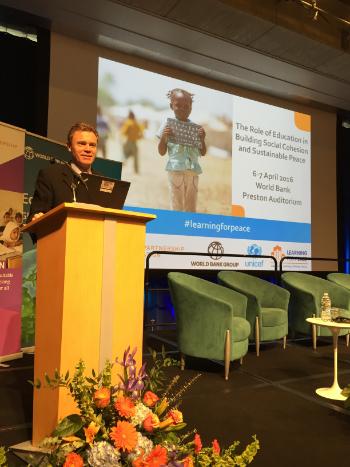Dr. Neil Johnson, professor of physics at the University of Miami College of Arts & Sciences, was the keynote speaker at a conference hosted by the United Nations Children’s Fund (UNICEF), the Global Partnership for Education (GPE), and the World Bank, entitled, “The Role of Education in Building Social Cohesion and Sustainable Peace.”
 |
The event gathered together policymakers, government leaders, academics, and civil servants to present evidence on how education as a social service can strengthen the resilience of children, youth, and communities in conflict-affected countries by reducing violence, creating long-term opportunities for children and limiting the loss of human capital.
As the keynote speaker, Dr. Johnson delivered a Ted-like presentation that combined his expertise in complex systems modeling and big data research as effective tools for gathering and interpreting the information required to promote social progress and education in conflict-affected countries around the world.
“How can social cohesion be developed and measured in a system with lots of diverse actors and where a top-down organized approach is difficult to implement because of lack of resources? My solution, presented in the talk, is to make the most of the increasing social media and smartphone penetration in these countries. For example, in South Sudan there are approximately 200,000 people with Facebook accounts and most of these are young people, and there are about 2 million Internet users,” said Dr. Johnson.
He also suggested using real-time measurements of social engagement by analyzing how the public is using social media platforms, like Facebook, to openly discuss relevant topics, as well as paying close attention to what the combination of real-time data and complex systems models can tell about when a country is undergoing transformations. Such insights could help save potential sponsors money on peace projects and development initiatives, by flagging up interventions that would likely have less impact as opposed to those that would likely prove effective.
According to data presented by at the conference, by 2018, it is estimated that half of the world’s poor and out-of-school children will live in conflict-affected areas, but if education is offered as a social service, this may help create opportunities for children, reduce the risk of violence, and promote a culture of peace.
April 12, 2016

